Madagascar:
Fort Dauphin, Sampona, Maroaloka, Tsihombe, Beloha, Ampanihy, Betioky, Tameantsoa, Toliara
251 tanks
It’s always an adventure in some or even many ways, but that’s part of what makes it a rich experience.
Fear not-this letter is NOTHING like the last one which described things in far too much detail the details of which still anger me. This project definitely had its challenges, but extreme corruption with our partners was definitely not part of our
battles. In fact, each time we were stopped by police en route, we told them that we we going to distribute water tanks and we were let through-not a single bribe was paid and I’m so grateful that my co-riders heard me when I said that I refuse to pay anything to do God’s work.
We’ve worked in Madagascar before, so this project is a continuation. Our work is focused in the South and Deep South, where it’s hot and dusty and extremely poor. People exist. Rain is not frequent, but when it rains, it’s abundant and the water goes into the ground and turns the earth into thick mud but doesn’t otherwise get into the bodies of the people who are desperate for it…it’s just sad and wrong. We’ve seen and recently saw people taking water from filthy puddles-they would collect the water (usually at the side or middle of the road from a pothole), let the water sit until the mud goes to the bottom of the jerrycan, and drink the less dirty water at the top. It’s all about survival.
This project had been an uphill battle since the start-if I hadn’t had such a clear sense of direction, I would quite probably have abandoned it, thinking it wasn’t God’s will.
Tank prices are exorbitant, and I only knew of two suppliers, so I was somewhat cornered, transport prices are also complete madness, and money wasn’t flooding in. I would have made a lot of sense on a natural level to do something easier, but I’m
aware of the need and can’t ignore it.
Those beautiful blue, 1000 litre tanks are a testimony to the 100 people who will drink from each of them that they’re not forgotten. That God has remembered them, and people whom they’ll never see in this life have given of their hard-earned funds to help them in the most basic but incredibly important way… with access to clean drinking water.
The project has been in planning for 2 years. I’ve been knocking on every possible door to find funding, then working on the many details from many angles, which are part of these projects. For the first time since we began the project 18 years ago, our supplier offered us the possibility to complete payment up to 6months after the project. We barely had half the amount on our account, and I felt the peace to go ahead and accept his offer and do the project in order to avoid losing yet another rainy season.
I’ve also become quite aware that, as we saw during COVID, borders can shut down with very little notice. It felt right to seize the moment and go forward.
As I write this letter, we’re still approximately $30,000 USD in debt.
Our partners on the field, the Anglican Diocese of Tulear, with whom we’ve worked together since 2010 and who have proven themselves to be precise and honest, did their part to choose the areas where the tanks are most needed. Some regions were familiar in name to me from earlier projects, other regions were a first.
Our supplier somehow confused the delivery of the tanks and sent out the last ones first (to one transporter) and sent out the ones we would first be visiting last. The transport company, in turn, needed to fill up the trucks to make the journey worthwhile for them, and we found day after day being shaved off our originally comfortable schedule. It reminded me a lot of the story in the bible of a man named Gideon who was going to fight their enemies, the Midianites. He began with a cushy 300,000 soldiers, that number dropped to 30,000, and finally he ended up with 300 men! It was all to show that it was the Lord fighting for them. 8 of our 13 days were lost in waiting. Thank goodness it was in a small town which was close to the water (Fort Dauphin), so it allowed me time to walk and pray and to deal with my frustrations about the way things were going..
We eventually left on day 9 at 4:30am, hoping to reach three regions and prepare and distribute approximately 50 tanks before the end of the day. By 6:30am, the vehicle was broken down at the side of the road, and we had to wait for a tuk-tuk to bring a mechanic from Fort Dauphin along with the part needed, in order to fix it. When I lived in Kenya we used to say, T.I.A. meaning, This Is Africa. At 9:30am it was already 36°c and we had yet to really start our long journey. You realize at times like that that getting irritated or finding fault/blaming is not the answer. Better to stay peaceful, pray for grace and trust that all will somehow work out. Much later that day, we got stuck in sand, with the driver not knowing how to negotiate this new element and the 4-wheel drive being reduced to a not so potent rear wheel drive. Lots of people came to our aid (at a price, I found out later), cutting pieces of bush to put under the wheels for traction, pushing the vehicle and doing all possible to get us on the move again.
We had finally managed to visit 2 areas: Sampona and Maroaloka, where we were warmly received. We shared a meal together out of one pot, and I felt very touched that, in their extreme poverty, they still thought of our well-being. Stands weren’t prepared as yet…the priest explained to me that a jerrycan of water can cost them 4000 ariary…that’s the equivalent of approximately 1€ and it represents an enormous amount of money to them because most of them have no job nor income of any kind.
Their lives are incredibly difficult but water is the most vital and basic necessity to any form of life, so what we’re doing is something that has the capacity to make a HUGE difference.
Over the next days, we’d get to the villages, the Reverend Donne would speak to the people and pray with them and encourage them, while I would be sanding and painting the tanks to get them ready for distribution.
Sometimes we’d arrive at our sleeping place at 11pm and leave the next morning at 4am or earlier, depending on how much ground we had to cover. One of the weirdest places where we lodged was a town called Egedi, which had the dubious reputation of being a place where organs were harvested…without consent.
We stayed at a place which had no electricity but which was trusted by my co-worker, and managed to find some food in a very local restaurant which didn’t have any hygiene rating on the outside. I was on high alert to hearing sounds of screams of distress, but I guess it’s more discreet than that (if it’s actually the truth).
5 days after starting, at nearly midnight, we reached Tulear, the home of the Diocese and where there were 116 more beautiful blue tanks which were waiting for my attention before we could start to distribute them to villages in that region. I had my flight out a few days later as well, so there was a lot to deal with.
We also had to go to a region an hour away called Androhinaly, along with surrounding villages, to visit tanks which had already been distributed. We had to find each one, explain the rules and paint each tank with the words, Jesus Loves You (to water their spirit). It was a fantastic opportunity to take pictures, but extreme heat and the need to keep moving in order to get back to Tulear to continue working on my sea of blue tanks before my planned departure 3 days later made it a very long and tiring day.
By God’s grace, it all got done by the evening of December 24th.
In the last message, there were still 15 tanks at the diocese. Their final destination is 200kms away, and transport prices are brutal. The Diocese is trying to find the money to help those villages access their tanks in the soonest possible amount of time.
To all of you who have given funds, who have prayed and encouraged me/us during this journey, I express our heartfelt thanks. When you’re in the midst of a project such as this one, you realize that it’s the work of many people coming together to serve so many people who are otherwise quite forgotten. I’m on the front line, but it’s God’s grace and all of your support which allowed us to distribute the 251 tanks, which will reach over 25,000 lives, in such a remarkably short period of time!
Thank you again for your support and encouragement!
PS: For those who are wondering why 251 tanks (rather than 250), it’s because I have a habit of asking for 1 donated tank per 100 paid for. Our supplier agreed to one tank.
PPS: If you’re interested in our journey, here are the villages we went to and the distances between them:
Fort Dauphin – Sampona: 101km
Sampona – Maroaloka: 17 km
Maroaloka – Tsihombe: 83 km
Tsihombe – Beloha: 55 km
Beloha – Ampanihy: 100 km
Ampanihy – Betioky: 89 km
Betioky – Tameantsoa: 56 km
Tameantsoa- Toliara: 132 km
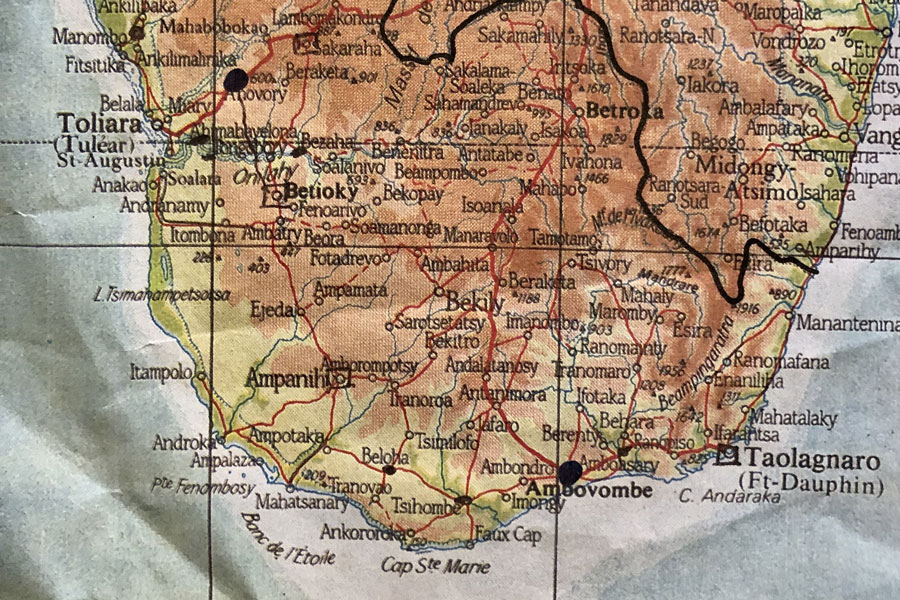
Map of Area |
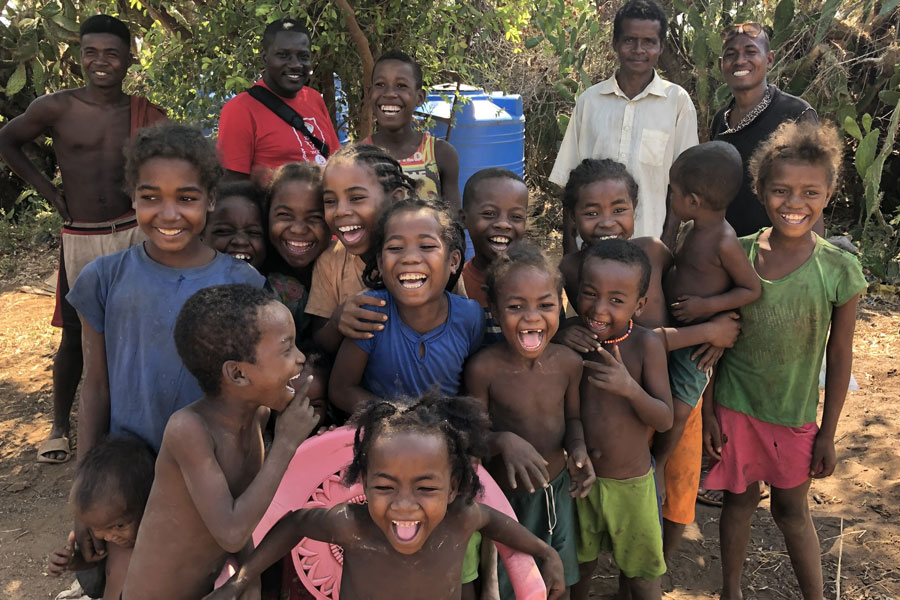
Laughing Children with a new water tank |
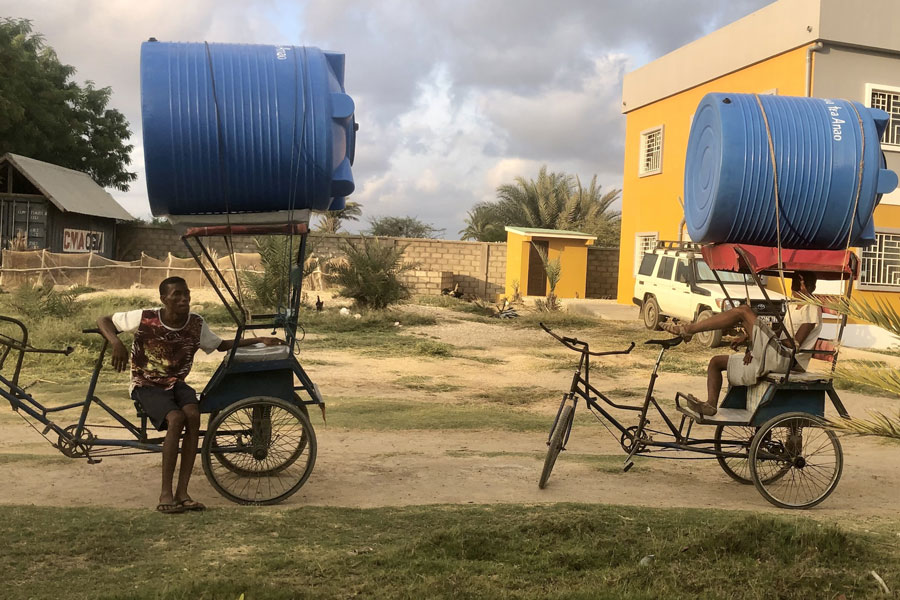
Tank Transport |
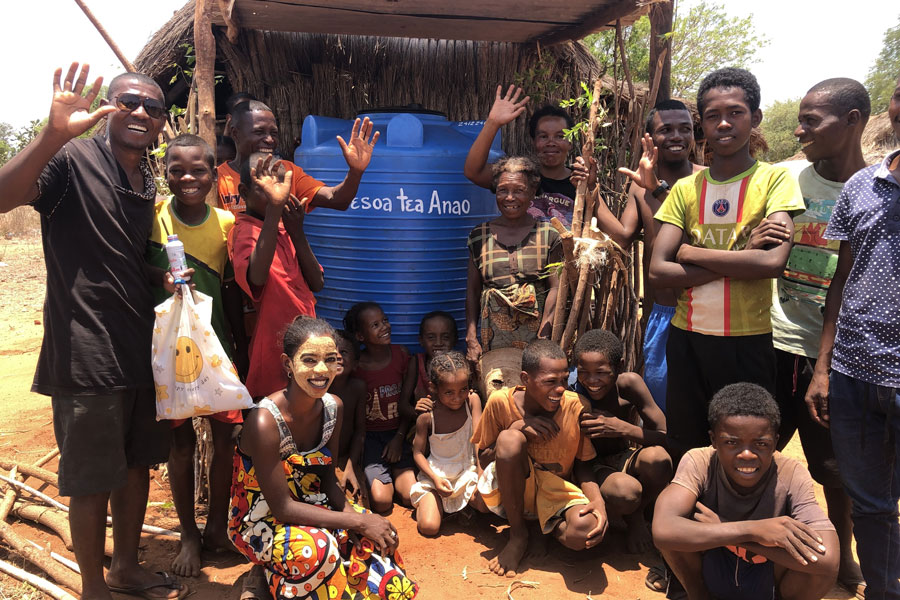
Smiles and Waves |
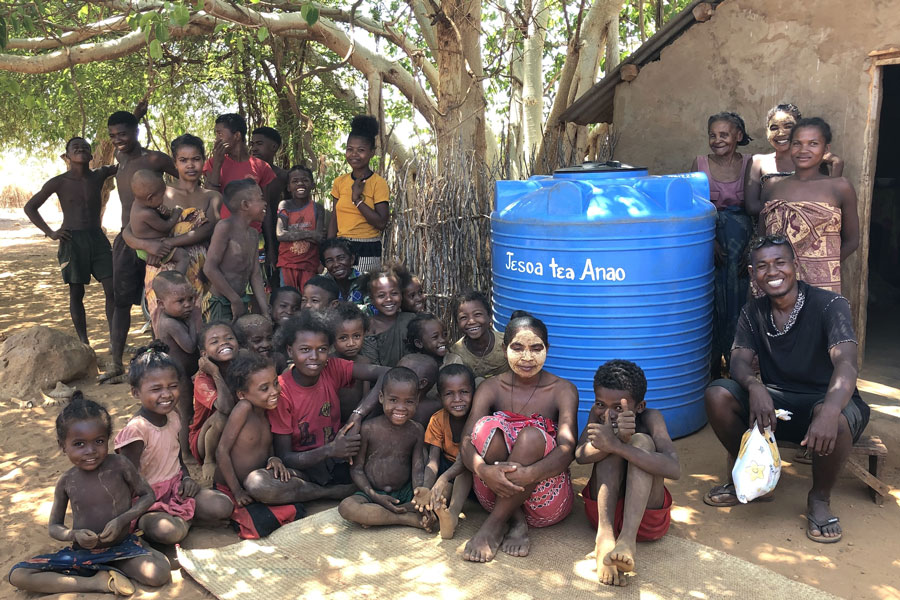
a large group of happy people |
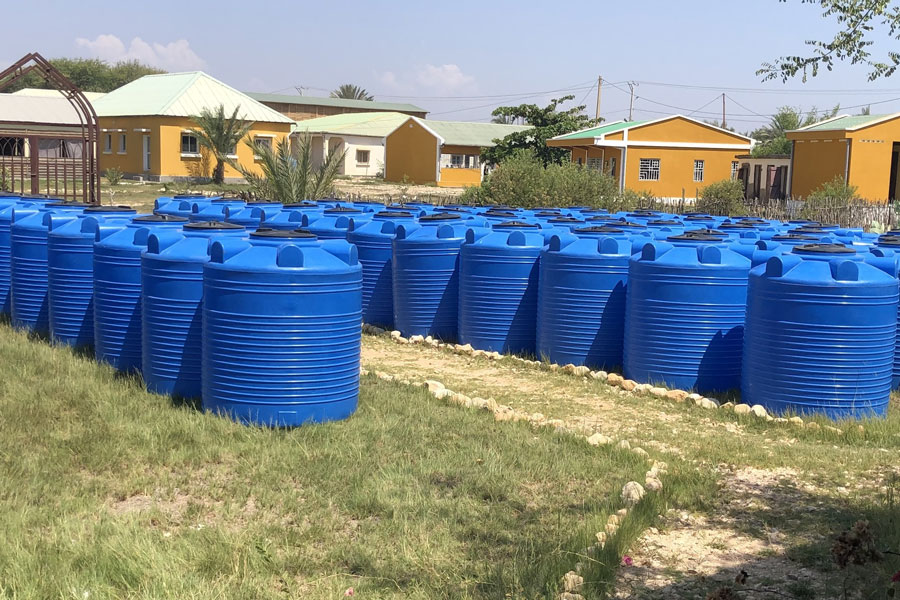
A field with 116 tanks waiting to be painted |

